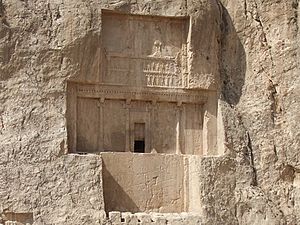Atossa facts for kids
Quick facts for kids Atossa |
|
|---|---|

Tomb of Darius the Great, where Atossa was also buried
|
|
| Queen mother of the Achaemenid Empire | |
| Tenure | 486–476 BC |
| Coronation | 486 BC |
| Successor | Amestris |
| Queen consort of the Achaemenid Empire | |
| Tenure | 520–486 BC |
| Coronation | 520 BC |
| Predecessor | Cassandane |
| Successor | Amestris |
| Born | c. 550 BC |
| Died | 475 BC |
| Burial | Naqsh-e Rostam |
| Spouse | Darius the Great |
| Issue | Xerxes I Hystaspes Masistes Achaemenes |
| House | Achaemenid |
| Father | Cyrus the Great |
| Mother | Cassandane |
| Religion | Zoroastrianism |
Atossa (Old Persian: Utauθa, or Old Iranian: Hutauθa; 550–475 BC) was an Achaemenid empress. She was a daughter of Cyrus the Great, and a wife of Darius I.
Name
The name "Atossa" (or "Atusa") means "bestowing very richly" or "well trickling" or "well granting". Atossa is the Greek (Ancient Greek: Ἄτοσσα) transliteration of the Old Persian name Utauθa. Her name in Avestan is Hutaosā.
Life
Atossa was born in c. 550 BC. She was eldest daughter of Cyrus the Great; her mother may have been Cassandane. According to Greek sources she married her brother Cambyses II after her father's death, yet it remains problematic to determine the reliability of these accounts. According to Herodotus, Cambyses supposedly married two of his sisters, Atossa and Roxane. This would have been regarded as illegal. However, Herodotus also states that Cambyses married Otanes' daughter Phaidyme, whilst his contemporary Ctesias names Roxane as Cambyses' wife, but she is not referred to as his sister.
When Darius I defeated the followers of a man claiming to be Bardiya (Smerdis), the younger brother of Cambyses II in 522 BC, he married Atossa. Atossa played an important role in the Achaemenid royal family, as she bore Darius the Great the next Achaemenid king, Xerxes I.
Atossa had a "great authority" in the Achaemenid royal house and her marriage with Darius I is likely due to her power, influence and the fact that she was a direct descendant of Cyrus.
Herodotus records in The Histories that Atossa was troubled by a lump in her breast. A Greek slave, Democedes, excised the tumor. This is the first recorded case of mastitis, sometimes interpreted as a sign of an inflammatory breast cancer.
Xerxes I was the eldest son of Atossa and Darius. Atossa lived to see Xerxes invade Greece. Atossa's special position enabled Xerxes, who was not the eldest son of Darius, to succeed his father.
Legacy
Minor planet 810 Atossa discovered by Max Wolf, is named in her honor.
The poet Matthew Arnold named his Persian cat ‘Atossa’. She is celebrated in his poem of 1882 called ‘Poor Matthias’, about the death of a pet canary.
See also
 In Spanish: Atosa para niños
In Spanish: Atosa para niños

